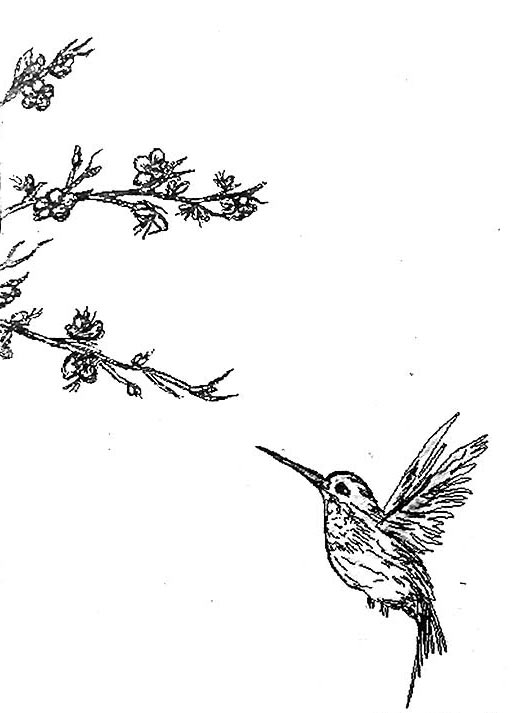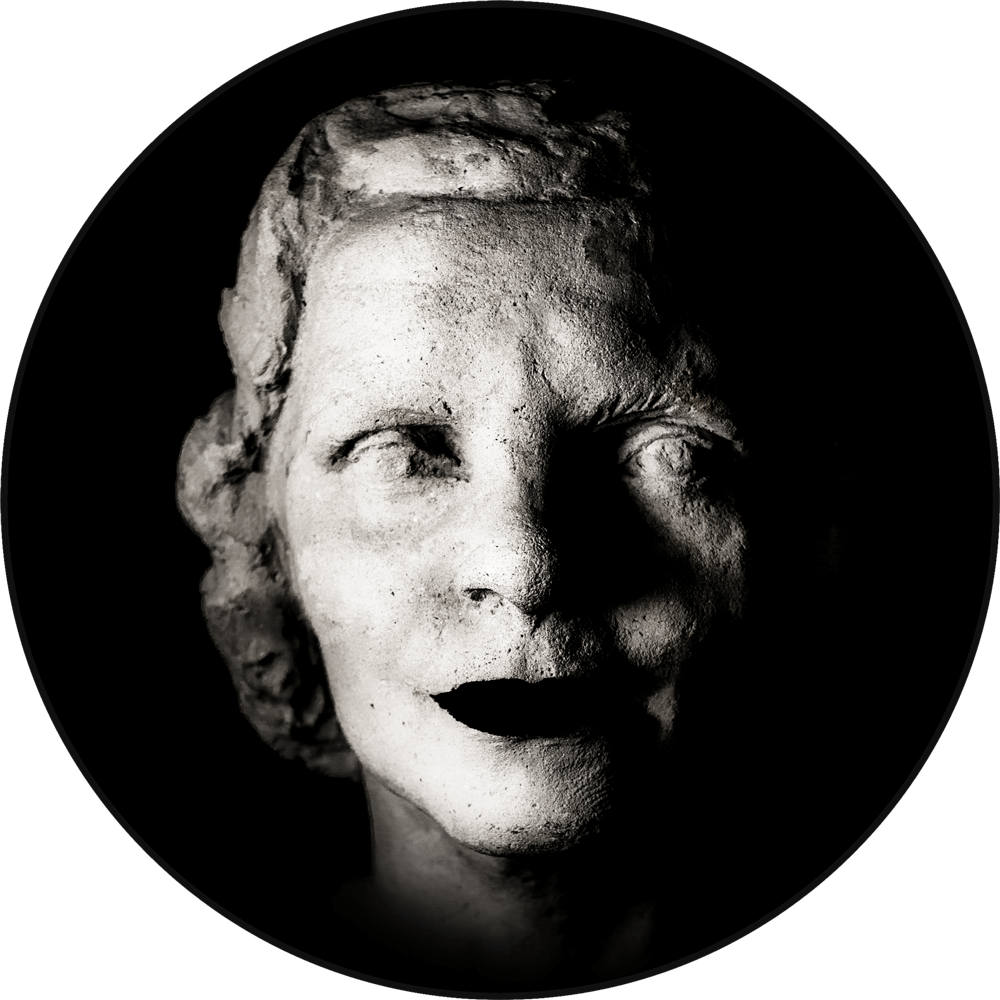


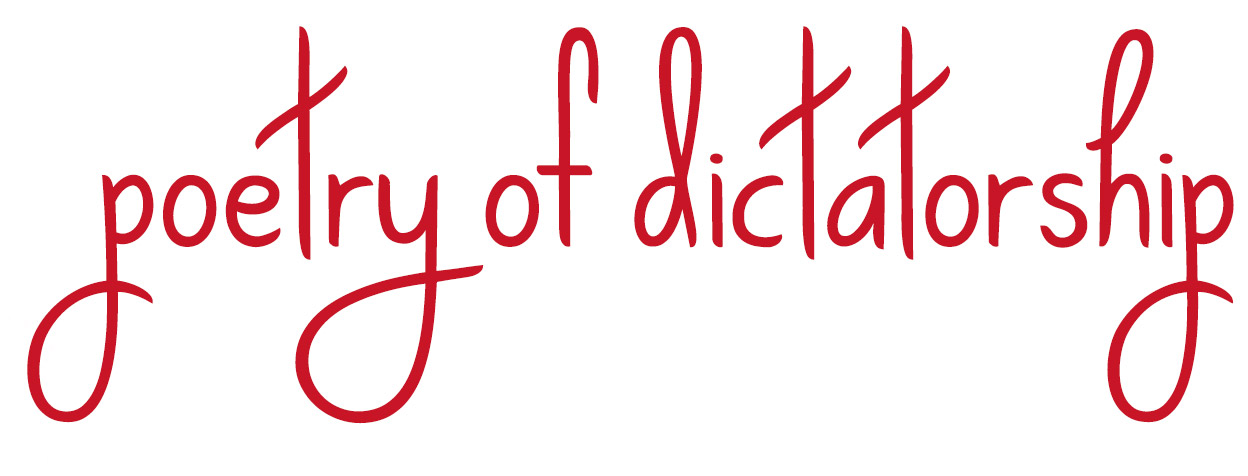
Uneori, când politica devine prea învolburată,
ai nevoie de poezie ca să o navighezi fără să îți pierzi mințile.
De pildă, atunci când milioane de turci au ieșit în stradă
și aproape au dărâmat regimul autoritar
dar până la urmă nu au făcut decât să grăbească
alunecarea spre dictatură.
Sometimes, when politics gets too chaotic,
you need poetry to make sense of it.
Like the time when millions of Turks took to the streets
and almost brought down the authoritarian regime
but in the end they only rushed
the descent into dictatorship.
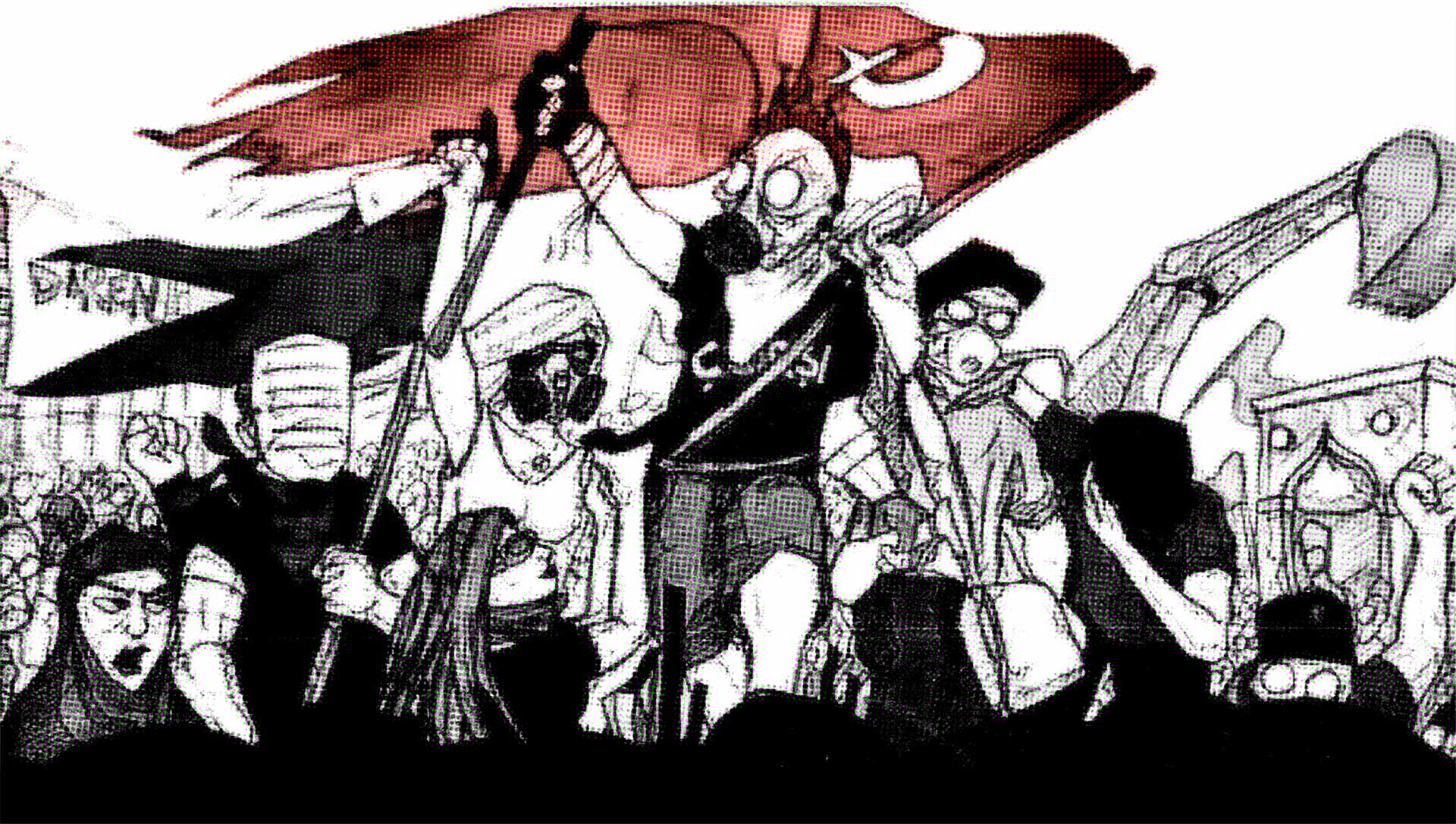
Ne simțeam puternici.
Simțeam că o să schimbăm ceva.
Credeam că vom câștiga.
spune Volkan, un tânăr turc
care s-a aruncat trup și suflet
în protestul din Piața Taksim, în 2013.
A fost cel mai fericit moment al vieții mele.
A locuit o săptămână în parc.
A făcut o bibliotecă liberă
și a cărat răniți.
Prea mulți au fost răniți,
prea mulți oameni au murit,
prea mulți și-au pierdut ochii.
Strigau.
We felt powerful.
We would change something.
We thought we could win.
says Volkan, a young Turk
who jumped in over his head
in the Gezi Park protest of 2013.
It was the happiest moment of my life
He lived in that park for a week.
He built a free library for protesters
and he carried away the wounded.
Too many were injured,
too many people died,
too many lost their eyes.
They screamed.

Autoritățile au așteptat o zi ploioasă
și au atacat.
Era dimineața devreme.
N-am putut să le ținem piept
decât vreo două ore.
Apoi am fugit.
Sute de morți.
Sute de mii de oameni epurați.
Sute de ziare desființate.
Tăcere.
Acum,
tinerii revoltați
publică poezii revoluționare
în reviste scoase la xerox.
The government waited for a rainy day
and then it attacked.
It was early in the morning.
We could only hold them back
for a couple of hours.
And then we ran.
Hundreds of people killed.
Hundreds of thousands of purges.
Hundreds of newspapers crushed.
Silence.
Now,
angry young men
publish revolutionary poems
in xeroxed magazines.
Nu vă imaginați că poezia
e doar pentru puștani înflăcărați.
Erdogan însuși,
înainte să fie liderul suprem,
a făcut pușcărie pentru o strofă.
Iat-o:
Moscheele sunt cazărmile noastre,
cupolele sunt căștile noastre,
minaretele sunt baionetele noastre,
iar credincioșii sunt soldații noștri.
Nu e cine știe ce,
dar nu merita pușcărie pentru asta.
Și nici poporul turc nu merita
ce i-a făcut după ce a ieșit.
Don’t think that poetry
is only a thing for fiery young men.
Erdogan himself,
before being supreme leader,
went to jail for reciting a verse.
This one:
The mosques are our barracks,
the domes our helmets,
the minarets our bayonets,
and the believers our soldiers.
Not great, not terrible
but he didn’t deserve prison for this.
And neither did the Turks deserve
what he did after he got out.
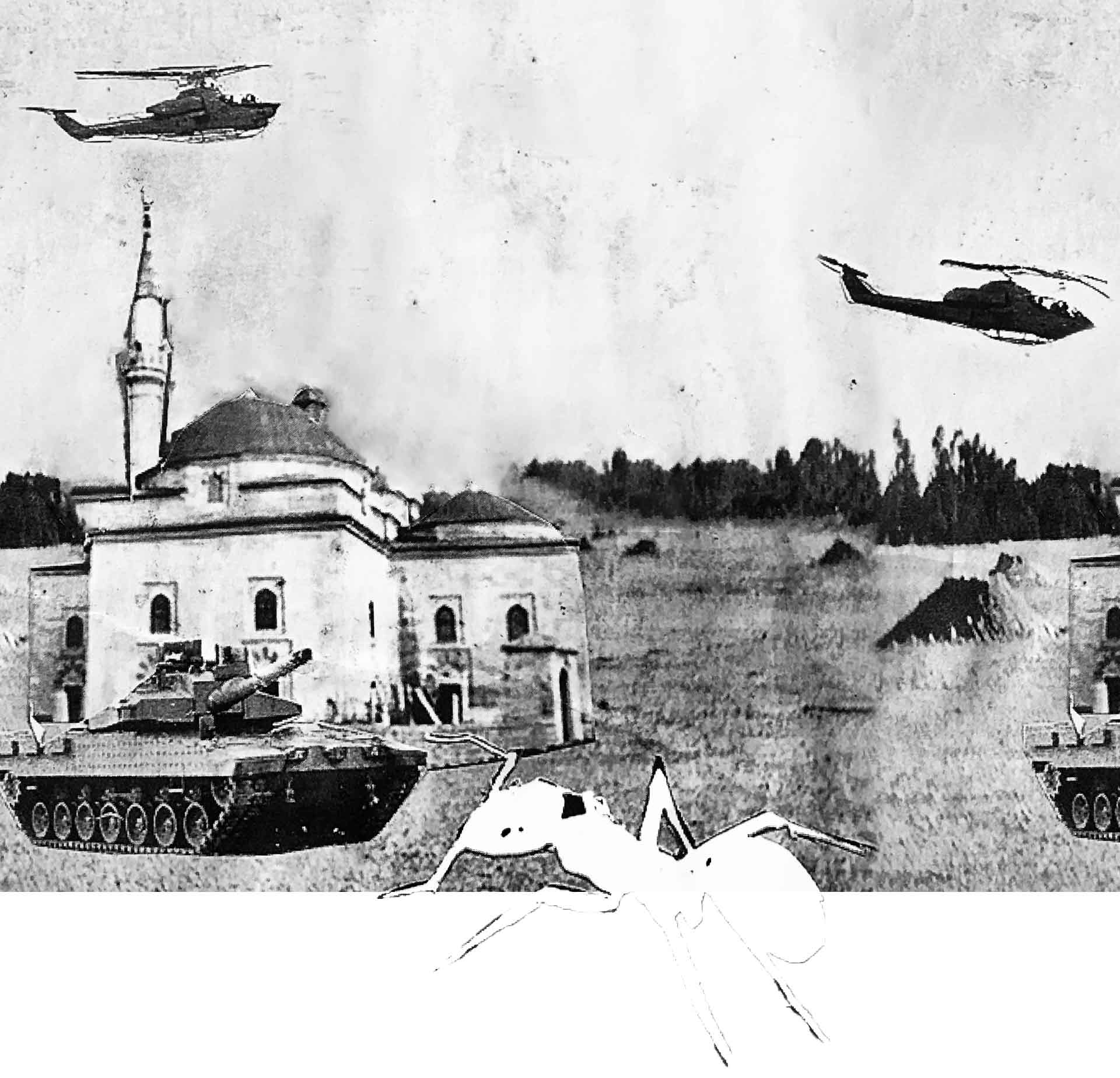
Volkan e mare fan Tristan Tzara
și asta se vede în frizura lui,
în camera lui, în viața lui,
în revista pe care o face.
Pune în ea speranțele generației sale.
Se numește VOID.
Ø
Primul lui protest a fost
la vârsta de trei ani.
L-a dus maică-sa,
care era profesoară în Adana.
Era o demonstrație pentru
un jurnalist asasinat.
O vreme a vrut
să se facă și el jurnalist,
dar a ales viața.
A mers în Istanbul să studieze film.
Locuia în Taksim,
lucra într-un bar tot acolo,
acolo și-a cunoscut prietenii
și tot acolo a încercat
să facă revoluție.
Ø
Greu să trăiești
în Istanbul după asta.
Poliție peste tot.
Societatea islamică
pune presiune
pe tine.
Mintea mea
încearcă să
se ascundă.
Volkan is a big fan of Tristan Tzara
and you can see it in his hairstyle,
in his room, in his life,
in the magazine he’s editing.
He pours into it the hopes of his generation.
It’s called VOID.
Ø
He went to his first protest
when he was three years old.
His mother took him,
she was a teacher in Adana.
It was a demonstration for
a journalist who was killed.
For some time he wanted
to be a journalist himself,
but he chose life.
He went to Istanbul to study film.
He lived on Taksim,
he worked in a bar there,
that’s where he met his friends
and that’s where he tried
to make a revolution
Ø
Hard to live
in Istanbul after this.
Police everywhere.
The islamic society
puts pressure
on you.
My mind
always tried
to hide.
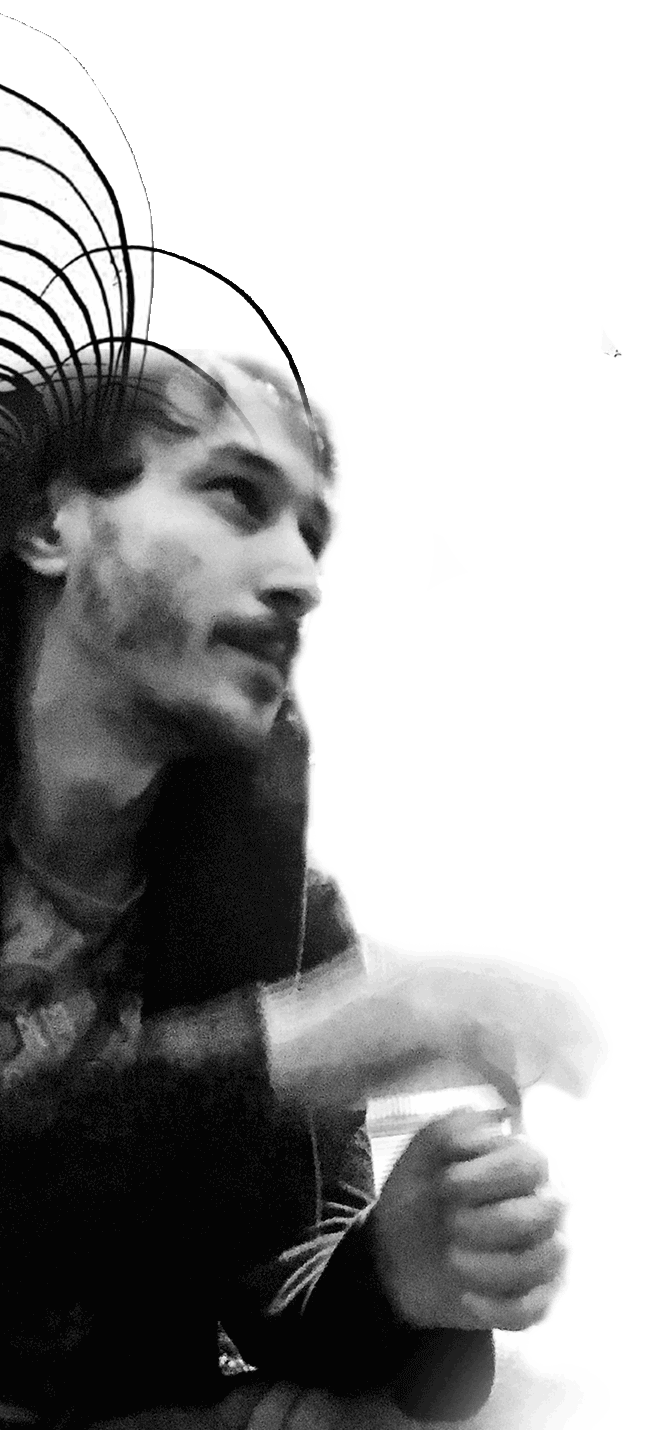
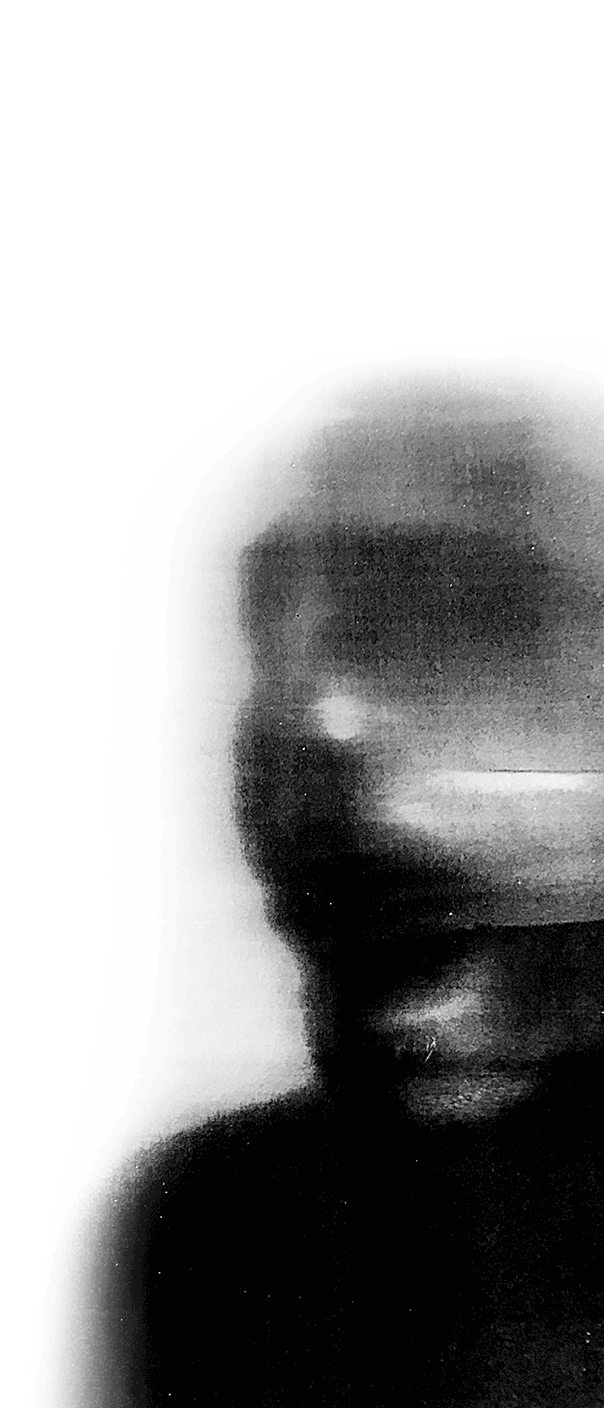
Nici nu mai vrem să mergem pe-acolo
ca să nu ne aducem aminte.
spune James Hakan Dedeoğlu,
un tovarăș de-al lui Volkan
care face de 15 ani o revistă
serioasă de cultură.
După anii ‘80,
marcați de o lovitură de stat militară,
cultura turcă s-a deschis în anii ’90
către Occident. Miezul era la Taksim.
Era dur, haotic.
Toată lumea avea o voce.
Când a venit Erdogan la putere,
a păstorit creșterea economiei
și o epocă de capitalism islamic.
Peste tot s-au construit
mall-uri și moschei.
Așa a început revoluția din Taksim,
cu proteste împotriva demolării
unui cinema istoric.
Poliția a atacat regizorii,
i-a împroșcat cu gaze lacrimogene.
Ø
Gezi a fost atât de puternic,
dar s-a sfârșit atât de rău.
A fost o înfrângere.
Oamenii s-au retras în cartiere.
Au început să acționeze local.
People don’t even want to go back there
so they won’t remember.
says James Hakan Dedeoğlu,
a friend of Volkan,
who edited a proper cultural magazine
for the last 15 years.
After the ‘80s,
marked by a military coup,
Turkish culture opened up in the ’90s
to the West. Its core was Taksim.
It was rough, chaotic.
Everybody had a voice.
When Erdogan came to power,
he triggered an economic boom
and an era of islamic capitalism.
Everywhere they built
malls and mosques.
That’s how the Taksim revolution began,
with protests against the demolition
of a historic cinema.
The police attacked film directors,
sprayed them with tear gas.
Ø
Gezi was so strong, so powerful,
but it ended in a bad way.
It was a defeat.
People retreated to their neighbourhoods.
They started doing things locally.
Poezia a făcut un salt!
strigă poetul Şevket Kağan Şimşekalp
în timp ce ascultă Metallica
la maxim.
În subterane
e o reacție foarte puternică
la dictatura asta.
Crede că întreaga societate
suferă de ceva boală mintală
și asta e șansa ei să se trezească.
În anii ‘80,
s-a născut o generație apolitică.
Au fost creați oameni adormiți.
Nu s-au trezit până la Gezi.
Poetul e cuprins de entuziasm,
vorbește de renașterea poeziei
ca programare pe calculator,
apoi se prăbușește:
Poeții de avangardă din estul țării
sunt băgați la pușcărie sau executați...
Poetry made a jump!
shouts poet Şevket Kağan Şimşekalp
while listening to Metallica
at full volume.
In the underground
there’s a very strong reaction
to this dictatorship.
He thinks the whole society suffers
from some kind of mental illness
and this is its chance to wake up.
In the ‘80s,
an apolitical generation was born.
Sleeping people were created.
They did not wake up until Gezi.
The poet gets filled with enthusiasm,
he claims the rebirth of poetry
as computer programming,
then falls into himself:
Avant-garde poets in the East
are either put in prison or hanged...
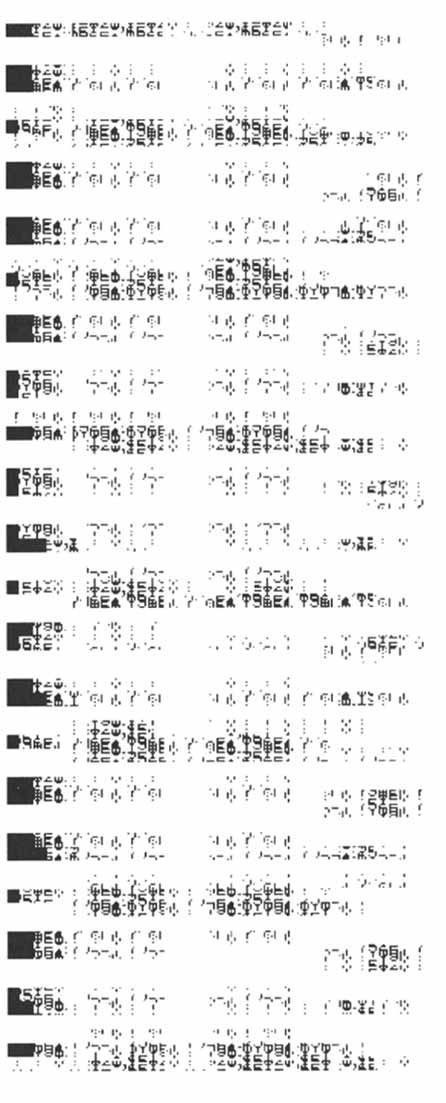


Poezia politică e o tradiție locală.
spune Efe Duyan,
poet și profesor
la Universitatea de Arte.
Poezia e politică din secolul 19.
Elitele erau poeți.
Au văzut Revoluția Franceză
și s-au întors cu idei despre naționalism
și modernism și futurism.
Altă tradiție locală:
să bagi poeții la pușcărie.
Nâzım Hikmet,
cel mai important poet,
a fost condamnat la 28 de ani.
Tot ce scria venea ca un șoc.
În anii ‘60 și ’70,
la fiecare protest
erau poeți care recitau.
Efe Duyan a fost și el arestat
în timp ce participa la proteste.
Acum 10 ani am stat
10 zile în arest.
M-au săltat,
m-au bătut ca nebunii.
Atunci îți dai seama
ce sunt ei cu adevărat.
Ei nu cred
în vrăjeala asta cu democrația.
Taksim l-a schimbat pe Erdogan.
Îi era așa de frică de revoluție
că a renunțat la masca de democrat.
A devenit un dictator pe bune.
Mă opun pe față,
dar încerc să o spun cu grijă.
Și studenții ar putea merge la poliție
după curs. Se mai întâmplă.
Încerci să-ți păstrezi speranța
încerci să trăiești
să ieși în oraș
să porți fustă
să ceri un dram de justiție
poate mai puțină corupție...
Am avut tot timpul sentimentul
că trebuie să schimb lumea.
Încerc să rezist.
Scriu poezie.
nici poeziile
ca planurile mărețe
nu pot fi uneltite în detaliu
Political poetry is a local tradition.
says Efe Duyan,
poet and professor
at the University of Arts.
Poetry is political since the 19th Century.
The elites were poets.
They saw the French Revolution
and came back with ideas of nationalism
and modernism and futurism.
Also a local tradition:
sending poets to prison.
Nâzım Hikmet,
the most important poet,
was sentenced to 28 years.
Everything he was writing was a shock.
In the ‘60s and ’70s,
every demonstration
had poets reading.
Efe Duyan was himself arrested
while attending demonstrations.
10 years ago I spent
10 days in prison.
They took me in,
beat me like crazy.
That’s when you see
what they really are.
They don’t believe
in this democracy bullshit.
Taksim changed Erdogan.
He was so affraid of the revolution
he quit the role of democrat.
He became a proper dictator.
I’m openly opposed,
but I try to say it in a careful way.
Even students could go to the police
after the course. These things happen.
Trying to stay hopeful
trying to live
drinking out
wearing a skirt
asking for some basic justice
maybe less corruption…
I always had this feeling
that I have to change the world.
I try to resist.
I write poetry.
revolutions too
like grand plans
can’t be plotted in great detail


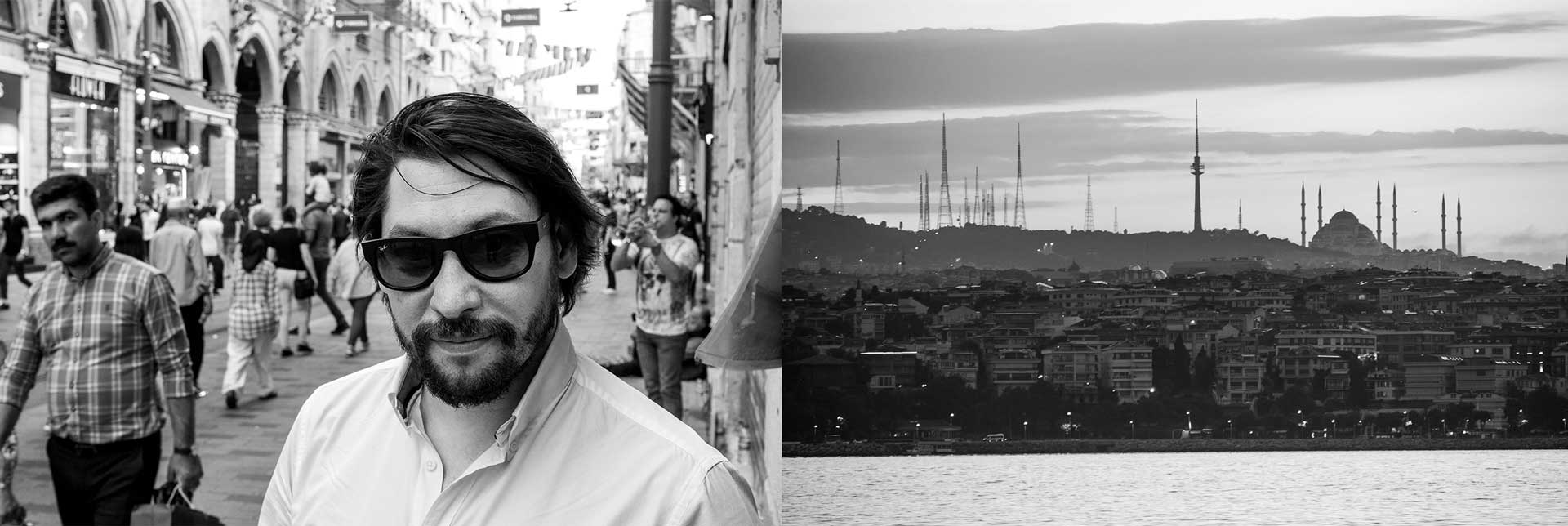
Uneori,
nici nu e nevoie să scrii tu poezia
ca s-o pățești.
Doctorul Altay Öktem
a fost forțat să-și dea demisia
din spitalul din Istanbul în care lucra
pentru că avea o colecție de reviste ilegale.
Colegii m-au văzut că strâng reviste
și m-au întrebat:
Ești satanist?
În vremea aia era o vânătoare de sataniști.
Poliția făcea liste cu roacheri.
Îi săltau pe stradă pe cei cu
plete sau tricouri negre.
El a scăpat cu demisia
și a ajuns să scrie cărți despre
cultura subterană.
Când era mic,
nu-i plăcea fotbalul.
Îi plăcea să citească.
Taică-su era ofițer,
și l-a trimis la liceul militar.
Nu-mi place armata!
Eram deprimat.
Când aveam puțin timp, citeam poezii.
Poeziile m-au ajutat.
Era haos prin Turcia.
Mulți oameni au fost omorâți în anul ăla,
1978.
În 1980 a fost o lovitură de stat militară.
M-au dat afară pentru că eram socialist.
Aveam 16 ani!
Nici nu știam ce-i ăla socialism.
Era haos.
Cum puteam să fac bani?
Am mers la medicină,
că-mi place să ajut oameni.
Meseria mea era foarte sângeroasă.
Vedeam mulți morți.
În timpul ăsta, citea Ginsberg
și Edgar Allan Poe.
Sometimes,
you don’t even have to write it yourself
to get in trouble.
Doctor Altay Öktem
was forced to resign
from his hospital in Istanbul because
he owned a collection of illegal magazines.
My colleagues saw I was collecting fanzines
and asked me:
Are you satanist?
In those times they were on a satanist hunt.
Police made list of rockers.
They picked them up on the street
if they had long hair or black shirts.
He got away by resigning
and ended up writing books about
underground culture.
When he was little,
he didn’t like football.
He liked to read.
His father was an officer,
so he sent him to a military highschool.
I didn’t like militarism!
I was depressed.
When I had a bit of time, I read poetry.
Poems helped me.
Turkey was very chaotic.
Lots of people were killed that year,
1978.
In 1980 there was a military coup.
They fired me because I was a socialist.
I was 16 years old!
I didn’t even know what socialism means.
There was chaos.
How could I earn money?
I went to medicine,
because I like to help people.
My job was very bloody.
Lots of dead people.
In the meantime, he read Ginsberg
and Edgar Allan Poe.
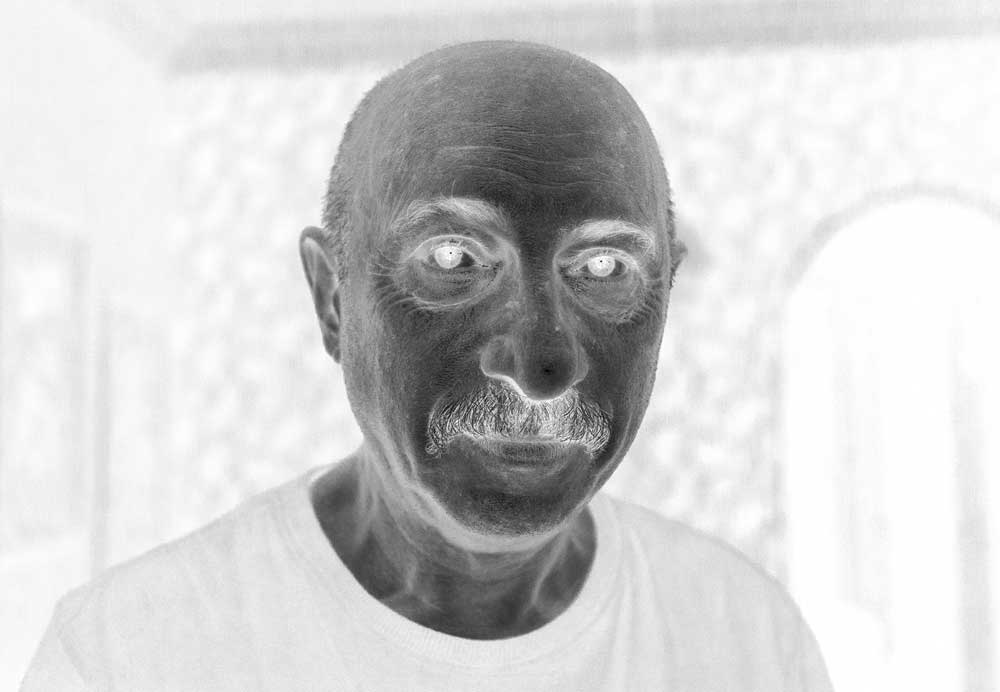
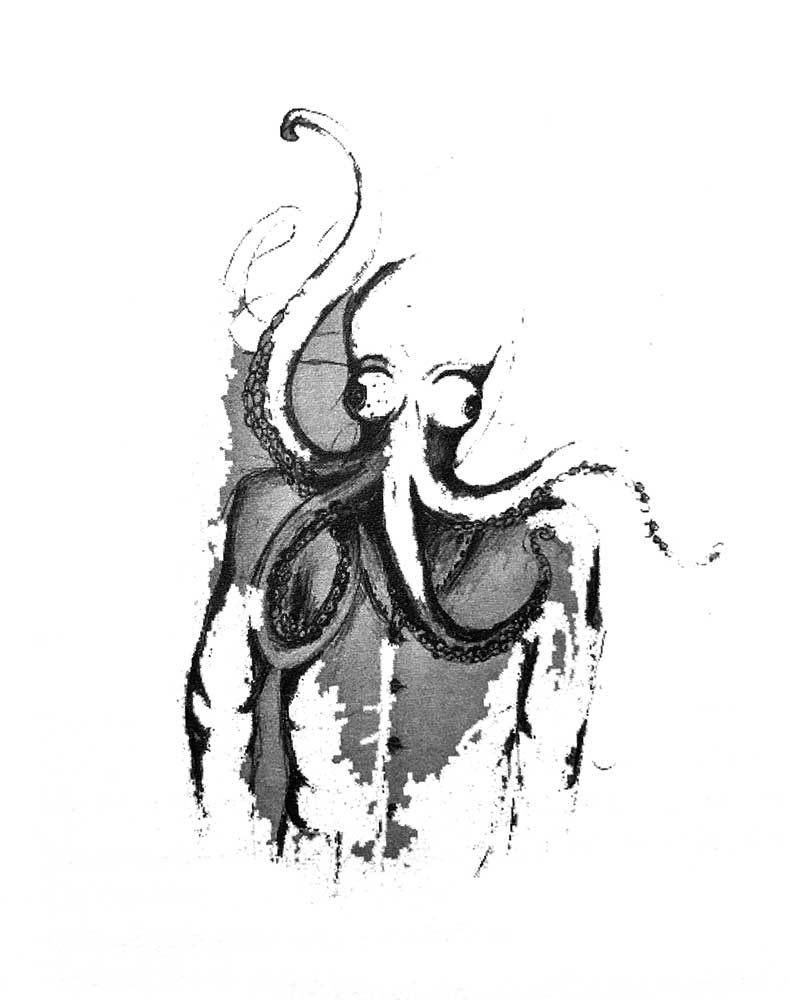
A început să colecționeze fanzine,
reviste informale trase la xerox
și distribuite din mână-n mână.
Aveau idei interesante,
dar nu puteau să le publice în reviste legale.
Aveau și ei familii…
Protestul din Taksim a fost momentul
în care pasiunea i-a acaparat viața.
A ieșit în stradă cu toată familia.
În Turcia, nimeni n-a mai simțit așa libertate.
Doar în parcul Gezi m-am simțit liber.
Ei cred că suntem teroriști.
De fapt, suntem cea mai bună parte a Turciei.
Trăim ca europenii.
Bem bere, facem sex...
Ne-am pierdut utopia.
Avem destule distopii, dar nici o utopie.
Trebuie să ne luptăm cu guvernul.
Creionul este o armă.
He started to collect fanzines,
informal xeroxed magazines
passed around peer-to-peer.
They had interesting ideas,
but couldn’t write them in legal magazines.
They had famlies, you know...
The protest in Taksim was the moment
when his passion took over his life.
He went into the street with his family.
In Turkey nobody felt freedom like this before.
Only in Gezi park I feel myself free.
They think we are terrorists
Actually, we are the best side of Turkey.
We live like Europeans.
We drink beer, we have sex...
We lost our utopia.
We have lots of dystopias, but no utopia anymore.
We have to fight with the government.
The pencil is a weapon.

Mă trezesc dimineața târziu.
Aoleu, e ziua alegerilor!
Cât dormeam eu,
au votat deja milioane de oameni.
Îmi vuiesc în cap toți cei
cu care am vorbit în ultimele zile.
Nu înțeleg cum pot să trăiască așa,
între teroare și exaltare.
Zilele trecute am fost
la un miting al opoziției
și am văzut milioane de turci
cum flutură ca steagurile
și răcnesc ca niște difuzoare
prin care vorbește contracandidatul,
un profesor de fizică mustăcios
ce scria cândva poezii erotice.
Ai auzit vreodată milioane de oameni
spunând câte un cuvânt la unison?
Tremură dealurile.
Răsună marea Marmara.
Și mie încă-mi răsună-n cap,
filtrat prin berile și manelele turcești de aseară,
cum se luptă perpetuu cu dușmanlar.
I wake up late in the morning.
OMG, it’s election day!
While I was sleeping,
millions of people already voted.
My head is roaring with all
the people I’ve been talking to.
I don’t understand how they can live
like this, between terror and exaltation.
Last days I’ve been to
an opposition march
and I saw millions of Turks
fluttering like flags
and shouting like loudspeakers
amplifying the contender,
a mustached physics teacher
who once wrote erotic poems.
Did you ever hear millions of people
shouting together one word at a time?
The hills are trembling.
The Marmara sea resounds.
And it still resounds in my head,
through last night’s beers and Turkish songs
about fighting eternal enemies.
Ies pe străzi,
e plin de puști automate,
ca la mitingurile lui Erdogan,
care a colindat țara într-un
autobuz tapetat cu fața lui imensă,
înconjurat de o armată personală,
cu elicoptere zburând pe deasupra
și lunetiști mustăcind pe acoperișuri.
Soldați înarmați aruncau jucării
la copiii spânzurați de garduri.
Oameni însuflețiți de ideea
că în orice alt loc nu sunt în siguranță.
Nu se mai poate așa,
îmi spune Volkan,
care în general crede că
toate partidele-s aceeași mizerie,
dar la tura asta n-ai cum să stai acasă.
E totul sau nimic.
Mergem la secția de vot
împânzită cu portrete ale sultanilor
și camere de supraveghere.
Apoi mergem la o înmormântare.
I go out into the streets,
automatic rifles everywhere,
like it was in the marches for Erdogan,
who toured the country in a bus
featuring his huge face,
surrounded by a personal army,
with helicopters buzzing around
and snipers mumbling on rooftops.
Armed soldiers were throwing toys
to children hanging on fences.
People animated by the thought
that all the other places are not safe.
This can’t go on,
Volkan tells me.
He used to think that
all the parties are the same crap,
but this time you just can’t stay on the side.
It’s all or nothing.
We go to a voting place
filled with portraits of sultans
and security cameras.
Then we go to a funeral.

Un tovarăș de-al lui,
artist,
a murit în condiții suspecte
și e acoperit acum de o cergă verde
cu un verset din Coran,
ceva gen murim cu toții.
Tineri cu geci de piele și părul țepos
se îmbrățișează
în timp ce imamul strigă Allāhu akbar
Allāhu akbar
Allāhu akbar
apoi îl bagă-ntr-o camionetă,
îl leagă cu o centură și pleacă,
aproape călcând o pisică
fără un vârf de ureche.
Ø
Seara se aud focuri de armă.
E sărbătoare. Și protest.
Oamenii aleargă pe străzi și urlă.
Bagabonți de-ai lui Erdogan
și fete islamiste din partidul aliat
șerpuiesc pe șosele.
Ici, colo, o pizdeală.
În cartierul nostru au adus tunuri de apă.
Noapte bună, Turcia.
A friend of his,
an artist,
died in shady circumstances
and is now covered in a green blanket
with a verse from the Holy Quran
something like we’re all gonna die.
Young people with leather jackets
and spikes are hugging each other
while the imam is shouting Allāhu akbar
Allāhu akbar
Allāhu akbar
then they shove him into a van,
fasten him with a belt and leave,
almost running over a cat
missing the tip of its ear.
Ø
In the evening we hear gunshots.
They’re celebrating. Others are protesting.
People are running around chanting.
Young men cheering for Erdogan
and islamist girls from the allied party
are snaking around the streets.
Here and there a brawl.
They brought water cannons in our neighbourhood.
Good night, Turkey.

Dimineața de după.
Mă trezesc pe la prânz,
pe o podea, cu capul umflat -
nici nu mai știu ce m-a pălit.
În jur e scrum peste tot,
deasupra mea un geam spart,
prin care intră miorlăitul unui muezin
și îi trezește pe ceilalți.
Se uită derutați unii la alții,
își amintesc ce s-a întâmplat
și își pun mâinile-n cap.
Se adună în jurul unei mese,
scot un caiet și adună idei:
ce-i de făcut?
Foaia rămâne goală.
The morning after.
I wake up at noon,
on the floor, with a swollen head -
can’t even remember why.
Ashes everywhere,
chants of a muezzin creeping in
through a broken window,
waking up the others.
They look at one another, confused,
remember what happened
and shrug in disbelief.
They gather around a table,
open a notebook and brainstorm:
what now?
The paper stays blank.

Epilog.
Am mers în Turcia anul trecut
la alegerile care au consfințit democratic
regimul dictatorial.
Toți oamenii pe care îi știam acolo
au emigrat când s-au nasolit lucrurile.
Unde să merg?
Cu cine să vorbesc?
I-am zis dilema mea
unui fotograf neamț hardcorist
pe care îl găzduiam în Casa Jurnalistului.
M-a pus în legătură cu un tip pe nume Erman
care mi-a zis că e totul e bine în Istanbul
apoi mi-a trimis revista lui, în care scria
oamenii nu mai protestează
doar se sinucid.
Bucureștiul părea un cartier al Istanbulului
când am pornit într-un autocar plin de hoți și bișnițari
cu gândul că am șanse mai mari decât ei să fiu arestat.
Erman m-a așteptat în portul Kadıköy
și m-a pus în contact cu o mulțime de oameni din scena underground,
apoi a dispărut pur și simplu.
Era pasionat de Cioran și depresiv,
la fel ca mulți dintre cei pe care i-am întâlnit
în acele zile îngrozitoare pentru spiritul liber.
M-am îngrozit și eu
pentru că era o paralelă clară cu ce se întâmpla în România
și în multe alte țări seduse de iliberalism.
Mi-a luat un an să scriu acest poem
ca un tribut pentru revistele lor.
Între timp, România și-a decapitat partidul conducător
Turcia a votat pentru prima oară împotriva lui Erdogan
iar Volkan a publicat un roman SF distopic
foarte apreciat pe insta stories.
Epilogue.
I went to Turkey last year
for the elections that democratically enshrined
the authoritarian regime.
All the people I knew there
left the country when things got nasty.
Where could I go?
Who should I talk to?
I told my dilemma
to a hardcore German photographer
who I was hosting in The House of Journalists.
He put me in touch with a guy named Erman
who told me everything is fine in Istanbul
then sent me his fanzine, which said
people not protest anymore
but commit suicide.
Bucharest looked like a neighbourhood of Istanbul
when I left in a bus full of thieves and smugglers
thinking that I have the best chance of getting arrested.
Erman picked me up in the Kadıköy harbour
and put me in contacts with loads of people from the undeground scene,
then he vanished just like that.
He liked Emil Cioran and was depressed
like many of the people I met
in those horrible days for the free spirit.
I was horrified myself
because there was a similarity to the situation in Romania
and other countries seduced by illiberalism.
I took me a year to write this poem
as a tribute fanzine.
Meanwhile, Romania cut the head of its ruling party
Turkey voted against Erdogan for the first time
and Volkan published a dystopian SF novel
very popular on insta stories.
